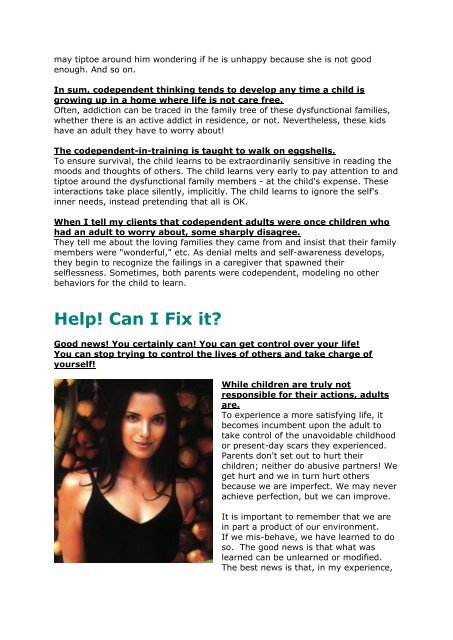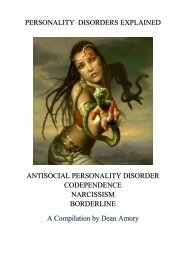CODEPENDENCE - DEAN AMORY
PERSONALITY DISORDER, CODEPENDENCE, RELATIONSHIPS, PSYCHOLOGY, LOVE, MATRIMONY, LIFE, LIVE,
PERSONALITY DISORDER, CODEPENDENCE, RELATIONSHIPS, PSYCHOLOGY, LOVE, MATRIMONY, LIFE, LIVE,
Create successful ePaper yourself
Turn your PDF publications into a flip-book with our unique Google optimized e-Paper software.
may tiptoe around him wondering if he is unhappy because she is not good<br />
enough. And so on.<br />
In sum, codependent thinking tends to develop any time a child is<br />
growing up in a home where life is not care free.<br />
Often, addiction can be traced in the family tree of these dysfunctional families,<br />
whether there is an active addict in residence, or not. Nevertheless, these kids<br />
have an adult they have to worry about!<br />
The codependent-in-training is taught to walk on eggshells.<br />
To ensure survival, the child learns to be extraordinarily sensitive in reading the<br />
moods and thoughts of others. The child learns very early to pay attention to and<br />
tiptoe around the dysfunctional family members - at the child's expense. These<br />
interactions take place silently, implicitly. The child learns to ignore the self's<br />
inner needs, instead pretending that all is OK.<br />
When I tell my clients that codependent adults were once children who<br />
had an adult to worry about, some sharply disagree.<br />
They tell me about the loving families they came from and insist that their family<br />
members were "wonderful," etc. As denial melts and self-awareness develops,<br />
they begin to recognize the failings in a caregiver that spawned their<br />
selflessness. Sometimes, both parents were codependent, modeling no other<br />
behaviors for the child to learn.<br />
Help! Can I Fix it?<br />
Good news! You certainly can! You can get control over your life!<br />
You can stop trying to control the lives of others and take charge of<br />
yourself!<br />
While children are truly not<br />
responsible for their actions, adults<br />
are.<br />
To experience a more satisfying life, it<br />
becomes incumbent upon the adult to<br />
take control of the unavoidable childhood<br />
or present-day scars they experienced.<br />
Parents don't set out to hurt their<br />
children; neither do abusive partners! We<br />
get hurt and we in turn hurt others<br />
because we are imperfect. We may never<br />
achieve perfection, but we can improve.<br />
It is important to remember that we are<br />
in part a product of our environment.<br />
If we mis-behave, we have learned to do<br />
so. The good news is that what was<br />
learned can be unlearned or modified.<br />
The best news is that, in my experience,


















